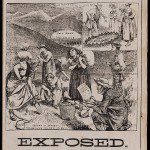When I noticed Mark Bishop had a new project out, I thought it might be a good idea to run a little interview with him. After reading through a couple other interviews he’d done, I knew it would be a good idea.
As a singer-songwriter who found solo success after his family group broke up at the turn of the millenium, Mark has filled an important niche in a genre traditionally dominated by quartets, trios, and mixed ensembles. I’ll call it “the James Taylor niche.” Where they bring sweeping anthems and barn-burners crackling with energy, Mark offers pensive, carefully crafted lyrics that tell a story—never flashy, always thoughtful, and able to fit more insight than you thought possible into a 3-4-minute nutshell. David Bruce Murray said it best way back in 2008 when describing his song “I Got Here as Fast as I Could”: “[I]t only took a few minutes for Mark Bishop to kill an entire family, reunite them in Heaven, and make a fine scriptural point.” If you ask Mark a simple question, you’re sure not to get a simple answer. But behind that philosophical bent is a keen sense of humor and a dry wit. In this interview, I ask Mark about his background and writing influences, his writing process, his favorite project, and his latest album. I also discovered a few things you might not have known about him! Enjoy.
Southern Gospel Yankee: You’ve described yourself as “an introverted singer-songwriter dude.” What singer-songwriters have inspired your work?
Mark Bishop: Back in the day, when I sang with my family, I was much more quiet and very content to stay in the background. My brother was much more comfortable in the spotlight and I was happy to find a quiet spot and work on my songs. In retrospect, if I had not started out that way, I might not have become a songwriter. In my observations, you have to be able to brood a little when you’re mining the depths of emotion in a song. As far as songwriters that have inspired me, that would be a long list, both secular and sacred. I guess some obvious Gospel influences would be Dottie Rambo, Ronnie Hinson and Mike Payne; in secular music, probably James Taylor, Paul Simon and Gordon Sumner.
SGY: At what age did you realize you had a talent for songwriting?
MB: Well, I never assumed that I had a talent for it. I just wrote. Before I wrote songs, I wrote other stuff. One of my favorite classes in high school was a creative writing class. I guess it might have been then that I realized that I was approaching writing and creative thinking a little differently than my peers. I guess at that age, everyone is finding out who they are and what they have an aptitude for, and for me, it certainly wasn’t math.
SGY: Do you tend to write music first and let that guide your lyrics, or vice versa, or both at once?
MB: Both at once. The melody and the lyric happen at the same time for me. It’s why my syllable count is so high. I cram a lot of words in there.
SGY: Your most ambitious project to date is Fields of Love, a concept album that tells a continuous story about a father and son in the American heartland. How long did it take to develop and write this project, and what provided the initial spark of inspiration for it?
MB: That’s my baby. If I am blessed to be able to write another thirty albums-worth of songs, I will probably not have a project that I am more proud of. That said, it’s probably one of my more obscure recordings. Our Southern Gospel Music industry really focuses on the artist continually sending songs out to radio in order to stay visible and praise God, I have been blessed to have been played a lot. But this particular album kind of defied the template and we don’t really know how to promote it for what it is, and what it is is a great emotional story. It’s not really the kind of album that you put on and listen casually in the background. It is though the kind of listening experience that if you give it your full attention, will immerse you in a whole other world.
The actual writing process took well over a year to complete, but it had gestated a couple of years before that. It was a whole different writing process and I had to approach it in a different way than a conventional song. The story itself was about familiar concepts to me and familiar traditions. Write what you know they say.
SGY: Your new album This is What It’s All About sounds a bit more country than usual. I hear hints of Kenny Rogers, Randy Travis and even Brad Paisley in there. Do you listen to country radio, or do you prefer the “good old days” of the greats?
MB: Oddly enough, I don’t really listen to country music, even though musically, that style is probably closest to what we do in Southern Gospel Music. Actually these days, I don’t listen to any music as much as I used to. But music is all around us so I hear things from a lot of genres that amazes me. And too remember, every week I am out singing with all of my friends in Gospel Music so I am hearing what they are doing and what their writers are writing so that keeps me pretty current on what everyone is doing. Sometimes, a lot of music can sound the same so what really excites me is what the lyric is saying.
SGY: I love your new “Gambler”-like tune “The Devil’s Playing Chess.” What inspired this original hook? Dare I ask, do you play chess yourself?
MB: It’s been a while since I’ve played a game of chess, but I played a lot in high school. I have no winning strategy and was never able to look more than a couple of moves ahead. As far as the song, I have to chalk this one up to divine inspiration. Although I have had many songs inspired by things I heard somewhere else, this one just popped into my head one day and I ran with it. I guess I have always loved the archetype of the wise old preacher passing on a wonderful insight to someone in need of direction.
SGY: Here’s a different question for you: What is the connection between literature and songwriting? Do you think a songwriter can enrich his work by becoming familiar with great poetry and prose?
MB: Great question! The answer is, it’s just creative thinking. Whether you are trying to connect literature and songwriting or painting pictures, sewing quilts, landscaping your yard or cooking in your kitchen. It’s all about expressing what you feel with the talents that God has given you. Everyone has a creative side and everyone expresses it differently. I just happen to write songs, but someone out there reading this has been blessed by God with talents in another field that are just as compelling.
I really wanted to write a novelization of my “Fields of Love” album and had a really great outline for a more fleshed-out story. I quickly learned that writing a novel and writing a song are two completely different skill-sets. I knew I could do it and I will still revisit it from time to time, but it is so time consuming and I have a hard time fitting it in with how busy I seem to stay. I wish that I had 36 hour days!
[Editor’s note: I look forward to the completion of that novel!]
SGY: Is there a story you could share about how a particular song of yours has touched somebody?
MB: This is without a doubt one of the most rewarding aspects of being a singer/songwriter: interacting directly with the person that God has blessed with the song that He has given you to write and perform. Every songwriter could tell you a hundred stories. When you come off the stage, you hear them every night. For me, I seem to hear a lot of response to the songs “Can I Pray For You” and “God Builds Churches With Broken People”; people that have sung my songs or played them for a dying friend. “I Got Here As Fast As I Could” brings a lot of people to me who are thankful for the reminder that we will see our loved ones again. “You Can’t Ask Too Much of Our God” has had me hear many stories of people who were grateful to be encouraged through tough times in their life. I keep the letters… very specific instances where one of my songs became a part of their life story at a crucial time. I guess I haven’t singled one out for you but, I’d feel awkward if one of those people happened to see their story here.
SGY: Name one song, any genre, that you wish you’d written.
MB: That’s a trick question. Do I answer “White Christmas” or “Happy Birthday” that have stood the test of time and everybody knows them (not to mention the financial benefits), or do I answer with a song that I think is just superbly well-written? Going with the latter premise, I could easily fill up pages and pages of songs that I have heard and marveled at what they spoke to me. I don’t think most songwriters really wish they had written a song; I think they might wish that they had had the idea first so they could have written their own version of it.
*****
I love that answer! My thanks to Mark for sharing his humility and insight with us!













